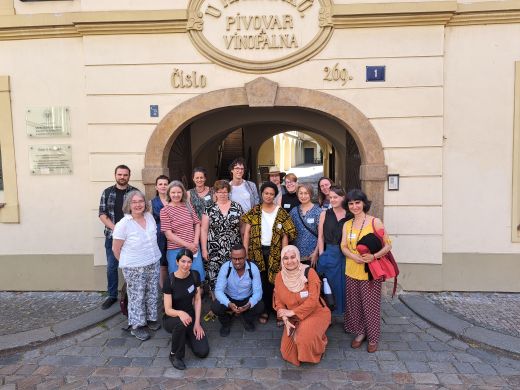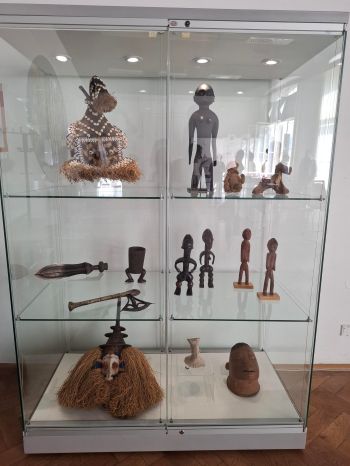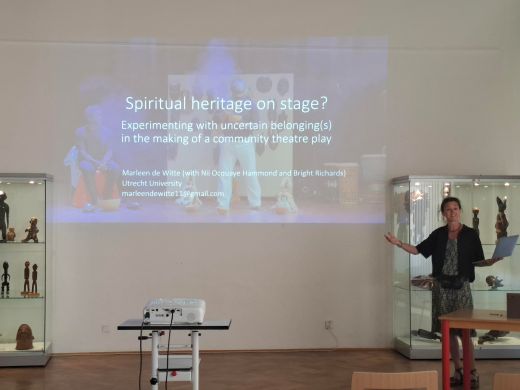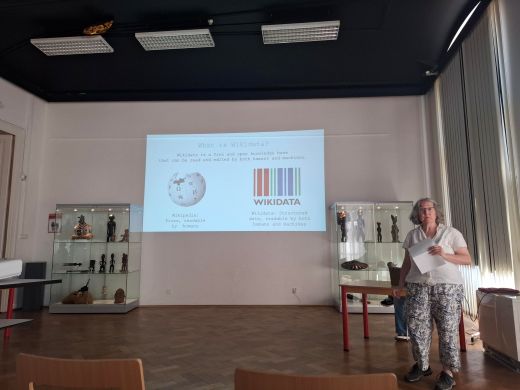African collections: from collecting to sharing and repatriating
 The annual meeting of the European Librarians in African Studies (ELIAS) this year coincided with the European Conference in African Studies (ECAS) held in the beautiful city of Prague. The ELIAS network is an informal network for librarians, archivists, and information specialists who work with materials from and on Africa in institutions in Europe. It is a great opportunity to exchange information, connect with professionals in the field, and to discuss developments in information and library science.
The annual meeting of the European Librarians in African Studies (ELIAS) this year coincided with the European Conference in African Studies (ECAS) held in the beautiful city of Prague. The ELIAS network is an informal network for librarians, archivists, and information specialists who work with materials from and on Africa in institutions in Europe. It is a great opportunity to exchange information, connect with professionals in the field, and to discuss developments in information and library science.
This year’s theme African collections: from collecting to sharing and repatriating appealed to an audience not only including librarians, but also academics, archivists and museum curators. Appropriately, the location was not a library but the Náprstek Museum, which houses the largest African collection in the Czech Republic (over 17.000 objects) and is part of the National Museum. Our host, Petr Valenta, kicked off the meeting with an overview of their African collection and shared some of the issues that have emerged during his 5-year curatorship.
 Coinciding with both the ECAS and ELIAS conferences, the museum organised a special exhibition cycle, entitled The World in the Vitrine: Masterpieces of African Art in the Náprstek Museum Collections, and a feature exhibition on the Czech traveler and explorer, Dr Emil Holub, on whose collected pieces the African Collection is largely built. We visited this exhibition together as a group at the end of the day.
Coinciding with both the ECAS and ELIAS conferences, the museum organised a special exhibition cycle, entitled The World in the Vitrine: Masterpieces of African Art in the Náprstek Museum Collections, and a feature exhibition on the Czech traveler and explorer, Dr Emil Holub, on whose collected pieces the African Collection is largely built. We visited this exhibition together as a group at the end of the day.
The Vitrine exhibition formed the visual backdrop in which the presenters discussed legacy collections, centering African perspectives and voices, decoloniality, and repatriation. The background perfectly visualised the first presenter’s paper that touched upon African objects being locked up in glass cages, detached from their context. Marleen de Witte (Utrecht University, Netherlands) in her presentation Spiritual heritage on stage, revealed the complexities and grey areas that emerge when diaspora communities reconnect with their African spiritual heritage, embodied through community theatre. Her project is part of Pressing Matters, an initiative across Dutch cultural heritage institutions to address questions of ‘colonial objects’, in support of societal reconciliation with the colonial past and its afterlives, and to find openings to deal with conflicting claims by different stakeholders for these objects within museums.
 Mariam de Haan (Lead Curator Africa, British Library, UK) and Eva Namusoke (Fitzwilliam Museum, University of Cambridge, UK) provided other angles on collections and critical engagement with and (re)presentation of collections. Eva presented the recently released report, African Future Collections, and reflected on the question of New Futures? Exploring the African collections at the University of Cambridge. She discussed the entanglement of past, present and future and the ‘violence’ people can experience when they enter public spaces, such as museums. How to sensitively and wisely engage with and address such issues? Mariam de Haan vividly shared how you can turn the tables when exhibiting such objects. This was done largely through audience engagement and included co-creation with families and children in the current exhibition Story Explorers: A journey through imaginary worlds.
Mariam de Haan (Lead Curator Africa, British Library, UK) and Eva Namusoke (Fitzwilliam Museum, University of Cambridge, UK) provided other angles on collections and critical engagement with and (re)presentation of collections. Eva presented the recently released report, African Future Collections, and reflected on the question of New Futures? Exploring the African collections at the University of Cambridge. She discussed the entanglement of past, present and future and the ‘violence’ people can experience when they enter public spaces, such as museums. How to sensitively and wisely engage with and address such issues? Mariam de Haan vividly shared how you can turn the tables when exhibiting such objects. This was done largely through audience engagement and included co-creation with families and children in the current exhibition Story Explorers: A journey through imaginary worlds.
The ELIAS network also covers archives with two contributions relating to special archives. The first, by Andreas Admassie (African Desk, International Institute of Social History, Amsterdam, NL), showcased how the IISH, in partnership with and at the demand of, African labour and trade union archives, collaborates to digitise and provide access to valuable materials and what their best practices and ethical considerations are. The second was a presentation on sound archives, by Cristina Sá Valentim (University of Lisbon, Portugal), to explore the resonance of colonial sound collections. In particular, African sound collections recorded in Angola in the 1950-70s. Part of those collections are held by the University of Coimbra which have been digitized and made available through an online portal. 
The ASCL Library staff was well represented with Ursula Oberst (information specialist) presenting, and Heleen Smits (collection development). Liesbeth Kanis was attending for the first time since starting as the Head of the African Library. Ursula together with Ashleigh Harris (Uppsala University) presented on the African Literary Metadata project ALMEDA - an ambitious initiative to make African oral and informal literatures accessible and better discoverable through a multilingual, linked open data platform. It aims to enhance the inclusion and representation of African literary knowledge in metadata.
ELIAS dates back to 2005 when the initiative was taken to form a network for librarians in African Studies across Europe. In 2007 the first ELIAS conference was held in Leiden, The Netherlands. And this year at the Annual Business Meeting of ELIAS, it was decided to hold the next ELIAS meeting of 2026 in Leiden once again, but now in the newly opened #African Library. So come and join us next year in Leiden!

